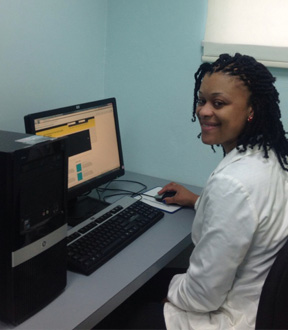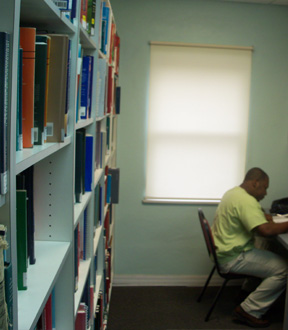|
CLINIAL LIBRARY
 |
 |
 |
Mrs. Patricia Hamilton, B.A., MLIS
Senior Librarian/Supervisor |
Mrs. Suja Philip, MA, MLIS
SCMR (UWI) Librarian |
Mrs. Daisy Gibson, B.A., CHCM
Circulation Desk - Manager III |
Ask Your librarian – 242-502-7830/502-7829
Email: medicalibrary@pmh,phabahams,.org |
The Health Sciences Community Library Hours
Mon. — Thur. 8:00 am — 11:00 pm
Friday 8:00 am —9:00 pm
Saturday 10:00 am—4:00 pm
Sunday Hours
February—July 2:00pm—9:00pm
Sep.— Dec.2:00pm—9:00pm
Summer Months July/August
Mon.– Thus 8:00am—10:00 pm
Friday 8:00am—8:00pm
Sat. 10:00 am—3:00 pm
|
Access UWI MONA Library
Online Database 24/7
SCMR (UWI) Students/Faculty
Call MIT Help Desk: 876-927 2148
Email:helpdesk@uwimona.edu.jm
(Your name and ID #)
Chat- MITS Helpdesk Live
For Assistance Contact: Mrs. Suja Philip, SCMR Librarian
email:medicallibrary@pmh.phabahamas.org
|
The journey of a thousand leagues begins with the first step. Advancing library services at the PMH has been quite a journey:
We made our first step some thirty years ago when two Consultants at the PMH donated some medical journals and standard reference textbooks to equip a small space adjacent to the Consultant’s medical secretary’s Office. There were many baby steps, other physicians chipped in and the shelves were filled. The “cubby hole” became a formal reading room – a place where physicians could seclude and avail themselves of a few standard medical journal subscriptions and reference textbooks on select disciplines in medicine.
In 1991, we made our first giant step; we established an Office of Continuing Medical Education at the PMH and signed on to become Classic Library Members of the Louis Calder Memorial Library, the health science information center for the University of Miami Miller School of Medicine, the University of Miami Health System and the Jackson Health System. We transformed our reading room to an international venue. Every physician employed at the PMH had access to one of America’s leading research and academic medical institutions, just next door. Our Medical Association of the Bahamas chipped in and donated a Fax machine - a $2500 tag at that time; this was cutting edge technology. Literature searches for information on diseases and their management with access to a collection of over 75,000 books and over 150,000 journal subscriptions, were at our finger tips and available at the speed of a telephone call. We are forever grateful to Mrs. Suzzette Burrows, the Calder Library’s administrator at that time. She served as our librarian consultant, providing her services free of charge, ensuring that the PMH medical library had all the prerequisite for a modern hospital library as for all accredited community based hospitals in the state of Florida. With the arrival of the Internet, we buried our fax machine, bought computers, installed our cable network and went on line. On our journey, we had reached a new milestone; we became a digital network library.
We never stopped moving. We expanded our stakeholder base to provide library services to all our hospital staff, nurses, allied health professionals and the health administrative team. We had a staff upgrade too. Mrs. Patricia Hamilton, initially a junior clerk as the sole but full time employee, joined us. She was keen and self motivated; it showed. Through the initial training programs at the Calder library, she enrolled at the College of the Bahamas, got a bachelors and subsequently in 2007 completed her masters in Library Science at the University of South Florida.
In 1997, the PMH made a quantum leap in medical education. The University of the West Indies established the clinical training program of its Faculty of Medicine there. Medical students could complete the final two years of the five-year program for their medical undergraduate programs. The process of transforming the PMH to a formal academic institution had begun.
The University incorporated the PMH library in its teaching complex. Our library services met this new challenge on all fronts. We had acquired a new physical plant, located in the new Oncology center, with a lecture room equipped with LCD projector and online services too! Staff complement was increased - two full time librarians and assistant; computer work stations were installed for students to access the Internet directly.
In 2010 we launched our journey full flight into cyberspace and beyond. We formed the Health Science Library Consortium – a formal contractual partnership between the College of the Bahamas, the Public Hospitals Authority, the Ministry of Health and the UWI School of Clinical Medicine and Research, The Bahamas. With our collective efforts we bought the EBSCOhost, an online data base service through proprietary software, valued at $36,000. For all our stakeholder constituents, each can access from their home computer the full collection of 7 core health databases that encompasses over 3000 health care journals - full text subscriptions, reflective of all the health care disciplines.
In 2010 we upgraded our computer software, hardware and broadband Internet services at the SCMR. Our enrolled medical students in addition have full access to the University of the West Indies library services in Jamaica – 31 international and 11 West Indian databases.
The journey of the development of the Health Science community Library of the PMH has been a success story, one of commitment, innovation, networking and partnership. It is a testimonial to the prudent management of limited resources in a developing country; proof that we can achieve a stat-of-the-art health science library, equal to any tertiary care institution in the Developed world. We embraced the benefits of medical technology and the Internet and stayed at the forefront of the information revolution.
We are indeed pleased to offer to the Bahamian community throughout the archipelago, the service of providing access and availability to health information, literature searches and reviews: Anytime, All the time… a finger tip away, in real time.
Our journey continues, join us.
“Education is more than a luxury; it is a responsibility that society owes to itself.” Robin Cook
|
|


|







